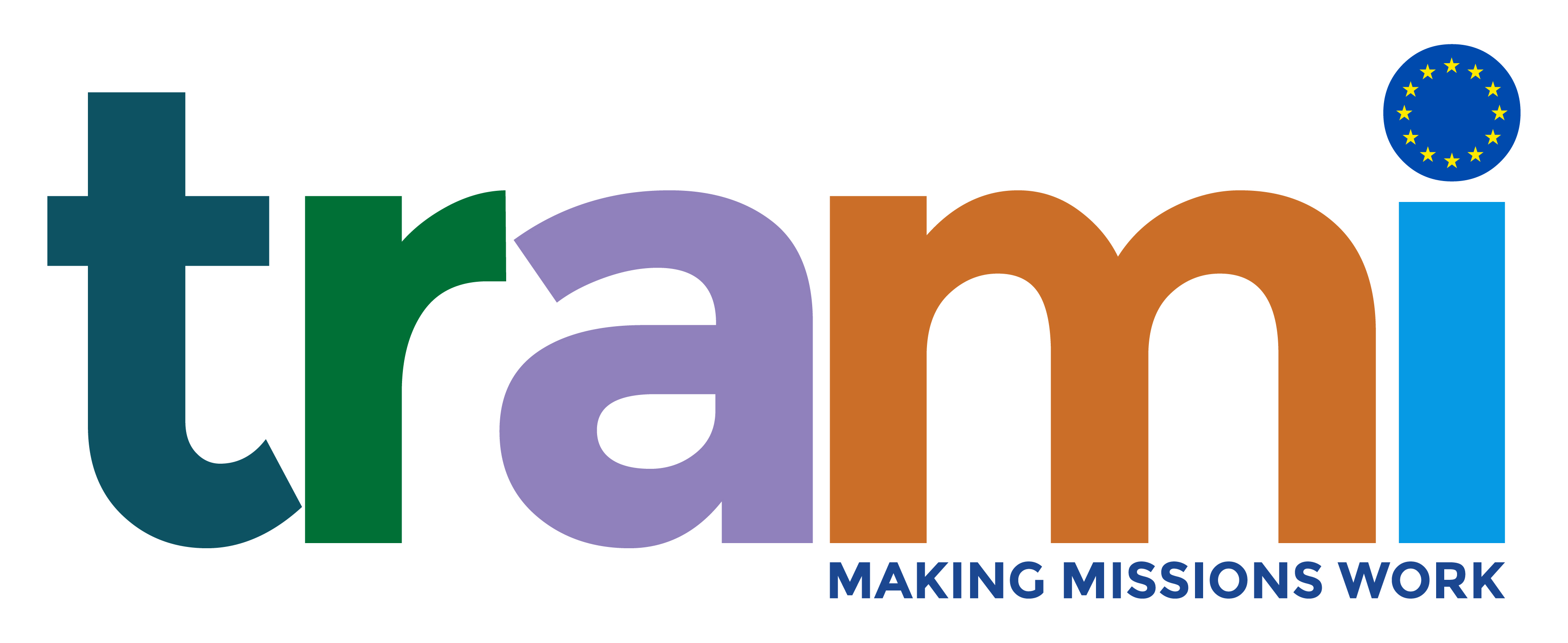Report on the second Mutual Learning Event
How do Swedish regions work with missions and how can this work be supported?
ORGANISER: Vinnova, SE
VENUE: Vinnova, Mäster Samuelsgatan 56, Stockholm, Sweden
DATE: 16 November 2022, 12:30 – 14:30, in person
Introduction
TRAMI’s mutual learning events provide an opportunity for different stakeholders to share experiences and learn from each other. This relates both to knowledge sharing and learning between stakeholders across Europe, and stakeholders within a country, or within a regional or local context. The aim is to support the development of suitable governance structures, implementation strategies and integration approaches to enable the implementation of the missions at national, regional, and local level across Europe. Regions are identified as a key stakeholder in the implementation of many of the EU-missions. The MLE at hand was carried out in a national – regional setting, inviting all (NUTS 3) regions in Sweden to discuss together with representatives of national agencies and the Ministry of Climate and Enterprise (former Ministry of Enterprise and Innovation).
Objectives of event
to facilitate knowledge sharing and learning across Swedish regions with a view to spreading of inspiration, good practice, and approaches in relation to the implementation of the EU missions at regional level and the integration into regional policy.
Attendees
Representatives from 19 out of 21 Swedish NUTS 3 regions, as well as representatives from Vinnova (Sweden’s innovation agency), The Swedish Agency for Economic and Regional Growth, and the Ministry of Climate and Enterprise.
Methodology
After introduction, the participants were discussing three main questions, including sub-questions at three different “stations”. All participants discussed and provided input to all questions in different group constellations. A presentation of the conclusions of each main question was presented to the entire participants group by the station rapporteurs, followed by a general discussion. The summary below details the conclusions to each of the three questions.
Please note that the mutual learning event was held in Swedish, which means that this report provides a translated interpretation of the discussions and conclusions made at the event itself.
Question 1: Is your region or other regional actors (e.g., municipality, city, academia, research institutes) involved in EU missions today? If yes – which ones?
None of the regions participating in the mutual learning event were themselves (as organisation) involved in any of the missions, but they identified other actors at regional level (e.g., municipalities, cities, academia, hospitals) that are involved in the EU-missions (i.e., participate in projects funded by Horizon Europe). The four missions cities, climate adaptation, cancer, and oceans all had other regional actors involved. There was no knowledge of participation in the soils mission.
There were a lot of other projects and initiatives mentioned that are related to the missions’ topical areas. Especially when it comes to climate adaptation, there is a multitude of regional projects and initiatives that share the goals with the mission, but they are not formally connected. These include “smart industry”, “green steel”, and “the energy solutions of tomorrow” where several regions collaborate in strategic partnerships. Also, the cancer mission was identified as having several relevant links with ongoing regional projects and activities. To conclude, there is a lot of resources and competences at the regional level that could potentially contribute to the fulfilment of the goals established within each mission.
There was also a general discussion around the five EU-missions – around the process of deciding on these five and whether the five are the most suitable ones. Several of the regional representatives voiced the opinion that the topics and goals formulated in the five EU-missions are in some cases not perceived as the most urgent or suitable ones from the regional perspective.
Q2: (How) can the mission goals be connected to other strategies or instruments? E.g., smart specialisation, partnerships for regional innovation, regional development strategies, etc? Which opportunities and challenges exist?
It was a general conception that the missions are too broad and not sharp enough. The concept of missions sometimes “collides” with the general task of the (Swedish) regions who are responsible for development and growth, while the missions are aiming at solving societal challenges. There is a level in between that needs to be worked on – how the overall mission goals translate to the regional reality. The missions are also perceived as requiring a different working method that the regions are not really prepared for. The support/vision from the political levels is also to a large degree missing.
While there were a lot of challenges mentioned around missions per se, the participants also articulated that they provide several opportunities. These include missions as an instrument to connect areas of smart specialisation to contribute to greater achievements. They can act as lighthouses, increase engagement from new actors and citizens, and pool resources from different fields, e.g., funding, competence, ownership, governance, regulations, and leadership.
In conclusion, the EU-missions bring a lot of opportunities, especially for creating greater visions, gathering projects, competences, and activities to a greater whole. There is, however, a slight hesitation to whether the missions provide the most relevant and useful goals. Are the EU-missions THE missions? There is also a great need for better understanding of the possible pathways, and how different other instruments and tools already in place (like S3, PRI, regional development strategies, other regional projects, etc.) can be or should be linked or connected with the missions.
Q3: How can the national level support, create relevant structures and/or instruments?
The participants identified a lot of areas where the national level (i.e., national funding and support agencies, as well as the Ministries) have an important role to play and provide support to the regions and to the ecosystems relevant for missions.
First and foremost, the national level should provide the overview and systems perspective. It was perceived by many that the structure of national agencies and ministries, and their respective areas of responsibility is unclear from the regional viewpoint. Thus, the national agencies themselves need to collaborate better and provide more unity and connectivity.
The second area for national support is to help “translate” the EU-missions to the regional level, to divide the processes in more easily understandable steps and to provide concrete examples, or at least provide fora where concrete examples can be shared. More concrete goals and clear definitions were perceived as helpful in gaining a better understanding of what missions aims to do and how it can be done.
The third area for national support was to provide fora for forming larger and new networks. Several participants voiced that “missions are not business as usual”, which means that not only new ways of working are required, but also that new networks and constellations need to be formed. Typically, these require actors from many different fields and levels, which might be challenging from a regional or local setting.
- Log in to post comments

